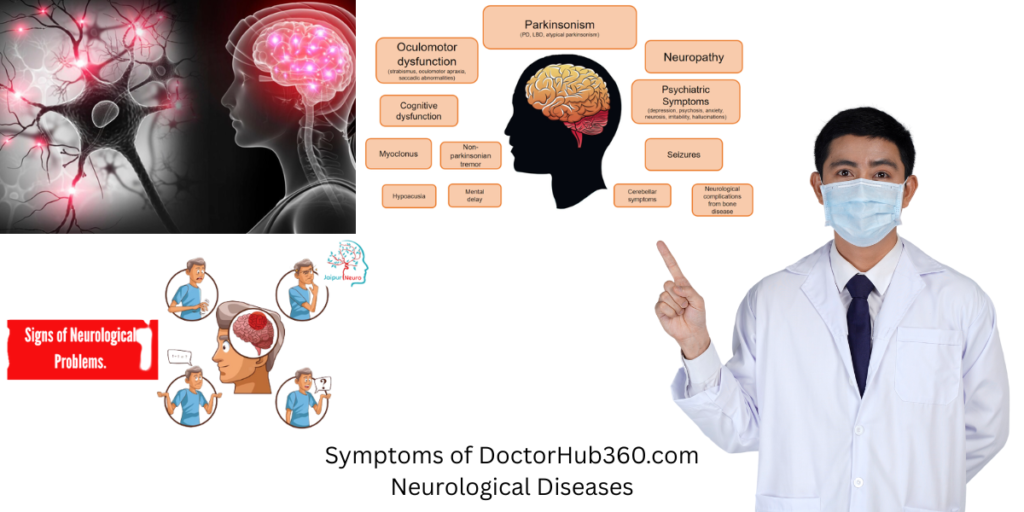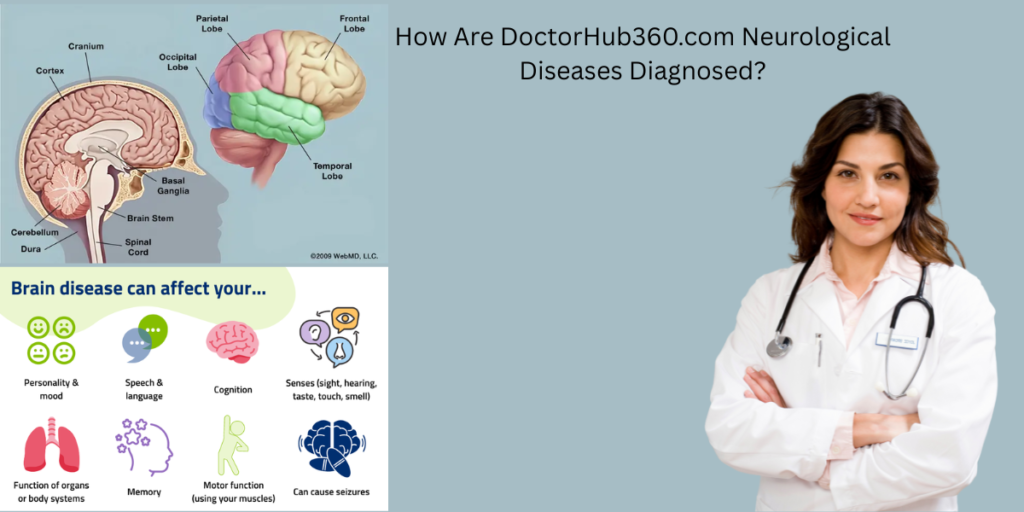Knowing neurological diseases in one way or the doctor would profoundly affect the lives of millions of individuals and their families worldwide. These diseases might afflict the brain, spinal cord, and entire nervous system to implant life-changing memories, personalities, motions, and bodily functions in every phase of a soul’s life. With the advances made in medical science, reliable and easy-to-understand information remains something that one would cherish. DoctorHub360.com Neurological Diseases has risen as one digital resource that provides extensive, patient-oriented information on neurological illnesses and enables hence patients, caregivers, and professionals to take informed decisions and manage the health aspects better.
What Are DoctorHub360.com Neurological Diseases
Any disorder, dysfunction, or injury affecting the nervous system consisting of the brain, spinal cord, and peripheral nerves are called neurological diseases. These conditions, depending on their causes, vary in their symptoms, progression, and treatment. Some are inherited or congenital, whereas others result from infections, injuries, autoimmune disorders, or age-related degeneration processes. Because this nervous system controls anything from thinking and moving to mere involuntary actions such as breathing these diseases are particularly disruptive to life.
Categories of Neurological Diseases
DoctorHub360.com Neurological Diseases covers a vast range of neurological conditions, grouped into several main categories for clarity and ease of understanding:
1. Neurodegenerative Diseases
This group of disorders is characterized by progressive neuronal loss with consequent impairment of brain and peripheral nervous function. For example, Alzheimer’s disease is one of progressive memory loss, while Parkinsonism is characterized by tremors and difficulty in movement.
2. Autoimmune DoctorHub360.com Neurological Diseases
DoctorHub360.com Neurological Diseases logic diseases are conditions wherein the immune system attacks components of the nervous system erroneously. Multiple sclerosis MS is an example, where the immune system attacks the myelin sheath of nerve fibers, giving rise to a myriad of symptoms that come and go, ranging from vision problems to paralysis.
3. Seizure Disorders
Epilepsy, the most common seizure disorder, is characterized by transient abnormal electrical discharges in the brain. Such seizures may be so brief and subtle as not to be noticed or so dreadful as to collapse their victim to the floor.
4. Movement Disorders
Apart from Parkinson’s disease, this category includes Huntington’s disease, dystonia involuntary muscle contractions, and Tourette syndrome characterized by repetitive, involuntary movements, and vocalizations.
5. Headache Syndromes
Many people suffer from chronic migraines, cluster headaches, or tension headaches. These types of headaches may be classified as primary or. Secondary headaches may be triggered by underlying medical conditions.
6. Cerebrovascular Disorders
Most people know stroke and transient ischemic attack TIA as cerebrovascular diseases. They are caused by reduced or impeded blood supply to the brain and, if untreated, can lead to permanent brain injury, disability, and death. DoctorHub360.com Neurological Diseases has created accompanying articles for each of these conditions. These articles discuss their causes, associated risk factors, progression, management, and additional available support.
Read more: Ztec100.com
Symptoms of DoctorHub360.com Neurological Diseases

Even if brain signs can change a lot, some common clear signs might be:
- Big or bad headaches
- Fast lose of seeing, hearing, or talking
- Feeling weak or not being able to move, mostly on one half of the body
- No feel or tickling in arms or legs
- Can’t remember, feeling mixed up, or shifts in how one feels and acts
- Can’t control steps, feeling dizzy, or trouble with staying steady
- Moves you can’t stop or shakes
- Fits or blacking out
Knowing these signs early is key for right finding and help. DoctorHub360.com Neurological Diseases gives lists and checks to help people know when to ask a doctor.
How Are DoctorHub360.com Neurological Diseases Diagnosed?

Diagnosing a neurological disease can be a challenging and intricate process that often requires the expertise of a specialist. DoctorHub360.com Neurological Diseases serves as a valuable source that explains the process step by step, thereby making it less enigmatic and helping patients to manage their expectations.
- Clinical Evaluation: An initial examination which involves checking the symptoms, going through the medical history, and performing a physical examination that mainly concentrates on the nervous system.
- – Imaging Tests: MRI and CT scans can show very detailed pictures of the brain and the spinal cord, which can uncover the presence of tumors, bleeding, or degenerative changes.
- – Electrodiagnostic Tests: EEG (electroencephalogram) is a device that records brain activity and is very useful in the diagnosis of epilepsy. EMG (electromyogram) captures the muscle responses and can be of assistance in locating the nerve damage.
- – Blood and Laboratory Tests: These tests can reveal infections, the presence of autoimmunity, or metabolism problems.
- – Genetic Testing and Lumbar Puncture: These are the methods of testing when inherited disorders are suspected or when the cerebrospinal fluid is examined for signs of infection or inflammation.
The website also provides the guides for patients on how to prepare
Read more: Gogoanime.fi
Latest Treatments and Innovations
Medical technology has brought many new ways to treat. DoctorHub360.com Neurological Diseases has the latest info on
- Medications: From anti-seizure drugs and dopamine agonists to medications targeting the immune system and biologic therapies for autoimmune diseases.
- Surgical Interventions: Options such as deep brain stimulation for Parkinson’s, epilepsy surgery, or treatments for brain tumors.
- Physical, Occupational, and Speech Therapy: Rehabilitation helps maintain or restore function, supporting independence and quality of life.
- Lifestyle and Mental Health: Diet, exercise, cognitive training, and mental health care are vital components of managing neurological diseases.
- Digital Tools: Telehealth, wearable monitors, and apps help patients track symptoms, communicate with healthcare teams, and manage medications.
Read more: ZO35-G25DA74 Model TV
Living with Neurological Disease: Patient and Caregiver Support
Dealing with a life-changing diagnosis is hard–for the patients and those who care for them. DoctorHub360.com helps with all aspects of care:
- Guides for Daily Living: Advice for adapting homes, managing medications, and handling nutrition and exercise.
- Emotional and Social Support: Tips for balancing mental health, rekindling relationships, and finding meaning despite limitations.
- Caregiver Resources: Strategies for avoiding burnout, accessing respite care, and connecting with local and online support groups.
Patients and families can share their stories and find encouragement in a supportive community, helping to break the stigma surrounding neurological diseases.
Staying Informed: Research, Innovation, and Community

One of DoctorHub360.com’s strengths is its dedication to continually updating content with the latest research and treatment breakthroughs:
- Regular articles on new therapies, promising drug trials, and advancements in brain science
- Practical explanations for non-scientists, ensuring anyone can understand and participate in health decisions
- Details on experimental treatments, clinical trials, and how patients can access novel therapies.
Community forums, live Q&As, and webinars with neurologists further connect users to invaluable knowledge and reassurance.
Read more: PeopleTools att
Conclusion
life with a neurological disease is full of courage, knowledge, and resilience. DoctorHub360.com brings together the latest in medicine, with understanding and community spirit, so that every visitor—be they patient, caretaker, or health care worker—can find real, sound, and current info. No matter what diagnosis, you are not alone: there is a world of resources and help at DoctorHub360.com Neurological Diseases
FAQs
Q: What makes DoctorHub360.com Neurological Diseases different from other health websites?
DoctorHub360.com is reviewed by doctors who specialize in neurology. It has a focus on being easy to understand. It has tools to keep you on top of your health, like a symptom tracker and reminder system. It is built around the community. It offers medical support and emotional support. We want you to feel comfortable and want to find the best way to help your health.
Q: Can I trust the information here for treatment decisions?
We want you to get the latest medical knowledge that is checked by experts before it is posted. We also want you to see your doctor for your unique health needs. We want you to get the right advice and treatment for you.
Q: Is there support for rare diseases or pediatric neurological conditions?
Yes, rare and pediatric disorders are covered. Patients can find up-to-date articles, links to advocacy groups and interviews with specialists.



